MercoPress. South Atlantic News Agency
Tag: IMF
-
Wednesday, December 19th 2018 - 09:20 UTC
Argentina officially in recession: economy sinks 3.5% in third quarter
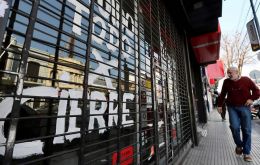
Argentina is in recession after its economy shrank by 3.5% during the third trimester of 2018, the state statistics bureau said on Tuesday. It was the second such shrinkage in a row after the economy shrank 4.0% in the second quarter, with respect to the same period a year ago.
-
Thursday, December 6th 2018 - 08:45 UTC
Argentine manufacturing and construction declines during October
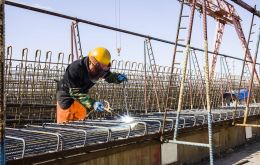
Manufacturing in Argentina fell 6.8% in October year on year, while construction declined 3.7%, and in the first ten months of this year 2.5% and 4.9% respectively according to the Indec statistics bureau report. Firms were hit hard by a contraction in economic activity and the devaluation of the Peso against the US dollar.
-
Tuesday, November 27th 2018 - 09:27 UTC
IMF praises Argentina's reforms program and anticipates rebound of activity in 2019
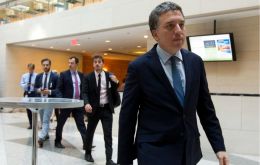
The International Monetary Fund has completed its second review of Argentina, the fund said on Monday, paving the way for the country to receive US$7.6 billion under a US$ 56.3 billion financing deal.
-
Tuesday, November 20th 2018 - 08:43 UTC
Venezuela preparing macroeconomic data to deliver to IMF

Venezuela which is sitting on one of the world’s largest crude oil reserves but which is suffering the worst loss of oil production in history outside of war-induced outages is getting ready to share macroeconomic data with the International Monetary Fund to avoid penalties including possible exclusion from the IMF.
-
Thursday, November 15th 2018 - 08:42 UTC
Argentina's Senate approves austerity budget agreed with IMF

After 13 hours of debate, the Argentine Senate approved the draft Public Administration Budget for 2019 early on Thursday. The project, presented by Mauricio Macri’s government, went ahead with 45 votes in favor, 24 against and just one abstention.
-
Saturday, October 27th 2018 - 09:38 UTC
IMF completes review of Argentina's stand-by loan; Lagarde praises performance

The Executive Board of the International Monetary Fund (IMF) completed on Friday the first review of Argentina’s economic performance under the 36-month Stand-By Arrangement (SBA) that was approved on June 20, 2018.
-
Wednesday, October 17th 2018 - 08:24 UTC
Jamaican economist will oversee Argentina's compliance of IMF accord

The International Monetary Fund has announced that Jamaican economist Trevor Alleyne will be the institution's representative in Argentina, after confirming it had decided to reopen an office in Buenos Aires, six years after leaving. The decision comes after Buenos Aires reached a deal with the IMF on the money supply, interest rates and an exchange rate framework.
-
Friday, October 5th 2018 - 09:03 UTC
Industrial activity in Argentina down 5.6% in August and 0.8% in last 12 months

August data for industry was only a slightly better figure than the previous month – in July, a decline of minus 5.7% was witnessed. In June, the sharpest, most pronounced fall of the year was witnessed: 8.1%, year-on-year.
-
Friday, October 5th 2018 - 08:36 UTC
Argentine Peso slips on Thursday on prospects of higher US interest rates
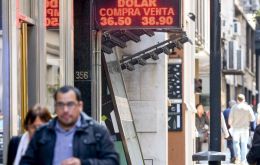
Argentina’s Peso fell on Thursday, pressured by the recession-hit country’s dismal inflation outlook and higher U.S. interest rates that have pushed capital away from riskier emerging markets and toward the greenback, local traders said. The peso shed 1.85% to close at 38.4 per dollar after having gained 9.58% over the previous three days under a freshly-renegotiated International Monetary Fund financing deal that calls for tougher fiscal and monetary policy measures.
-
Tuesday, October 2nd 2018 - 08:21 UTC
Argentine Peso rises 4% after central bank sells seven-day notes paying 72%
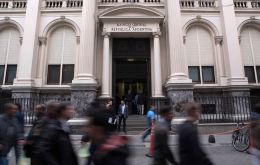
The he Argentine peso climbed more than 4% on Monday trading on the back of a debt sale by the central bank aimed at mopping up excess liquidity and signs that the International Monetary Fund (IMF) is solidly behind the administration of president Mauricio Macri.
